I have created a To-Do-List program that records tasks input by a user. For each task, the user must input the name, date, etc.
When the user selects "5" from the menu, the program will sort these tasks by their date. I need to sort all tasks based on the ascending order of the task’s date and time, i.e., the tasks with earlier date and time will be listed before the tasks with later date and time, and display the sorted list.
When I run my code however, I receive these errors:
Exception in thread "main" java.lang.IllegalArgumentException: Cannot format given Object as a Date
at java.base/java.text.DateFormat.format(DateFormat.java:338)
at java.base/java.text.Format.format(Format.java:158)
at ToDoList.lambda$0(ToDoList.java:238)
at java.base/java.util.ArrayList.forEach(ArrayList.java:1540)
at ToDoList.sortTasks(ToDoList.java:238)
at ToDoList.main(ToDoList.java:106)
Here is my code so far: ( The sortTasks() is at the bottom )
import java.util.ArrayList;
import java.util.Collections;
import java.util.List;
import java.text.ParseException;
import java.text.SimpleDateFormat;
import java.util.Date;
import java.util.Scanner;
class Task{
private String theTitle;
private Date theDate;
private String theTime;
private String theLocation;
private String theDuration;
private String theCategory;
SimpleDateFormat format=new SimpleDateFormat("dd/MM/yyyy");
Task(String title, Date date, String time, String location, String duration, String category) {
theTitle = title;
theDate = date;
theTime = time;
theLocation = location;
theDuration = duration;
theCategory = category;
}
public String getTitle() {
return theTitle;
}
public Date getDate() {
return theDate;
}
public String getTime() {
return theTime;
}
public String getLocation() {
return theLocation;
}
public String getDuration() {
return theDuration;
}
public String getCategory() {
return theCategory;
}
public String getItem() {
return theTitle + ", " + format.format(theDate) + ", " + theTime + ", " + theLocation + ", " + theDuration + ", " + theCategory;
}
}
public class ToDoList {
public Task myTaskObj;
SimpleDateFormat format=new SimpleDateFormat("dd/MM/yyyy");
private static List<String> currentList = new ArrayList<String>();
public ToDoList() {
}
public static void main (String[] args) throws ParseException {
ToDoList listObj = new ToDoList();
int menuItem = -1;
while (menuItem != 7) {
menuItem = listObj.printMenu();
switch (menuItem) {
case 1:
listObj.addItem();
break;
case 2:
listObj.removeItem();
break;
case 3:
listObj.removeAllTasks();
break;
case 4:
listObj.showList();
break;
case 5:
listObj.sortTasks();
break;
case 6:
listObj.searchTasks();
break;
case 7:
System.out.println("Goodbye!");
default:
System.out.println("Enter a valid option");
}
}
}
public int printMenu() {
Scanner scanner = new Scanner(System.in);
System.out.println();
System.out.println("----------------------");
System.out.println("Main Menu");
System.out.println("----------------------");
System.out.println("1. Add a task");
System.out.println("2. Delete a task");
System.out.println("3. Delete all tasks");
System.out.println("4. List all tasks");
System.out.println("5. Sort tasks by date");
System.out.println("6. Search for a task");
System.out.println("7. Exit the program");
System.out.println();
System.out.print("Enter choice: ");
int choice = scanner.nextInt();
return choice;
}
public void showList() {
System.out.println();
System.out.println("----------------------");
System.out.println("To-Do List");
System.out.println("----------------------");
int number = 0;
for (String item : currentList) {
System.out.println(++number + ". " + item);
}
System.out.println("----------------------");
}
public void addItem() throws ParseException {
System.out.println("Add a task");
System.out.println("----------------------");
System.out.print("Enter the task title: ");
Scanner scanner = new Scanner(System.in);
String title = scanner.nextLine();
System.out.print("Enter the task date (dd/mm/yyyy): ");
Scanner scanner2 = new Scanner(System.in);
Date date=format.parse(scanner2.next());
System.out.print("Enter the task time: ");
Scanner scanner3 = new Scanner(System.in);
String time = scanner3.nextLine();
System.out.print("Enter the task location: ");
Scanner scanner4 = new Scanner(System.in);
String location = scanner4.nextLine();
System.out.println("Enter the task duration (optional - press enter to skip): ");
Scanner scanner5 = new Scanner(System.in);
String duration = scanner5.nextLine();
System.out.println("Enter the task category (optional - press enter to skip): ");
Scanner scanner6 = new Scanner(System.in);
String category = scanner6.nextLine();
myTaskObj = new Task(title, date, time, location, duration, category);
String theItem = myTaskObj.getItem();
currentList.add(theItem);
System.out.println("Task Added!");
}
public void removeItem() {
System.out.println("Delete a task");
System.out.println("----------------------");
Scanner scanner = new Scanner(System.in);
System.out.print("What do you want to remove? (Enter number): ");
int index = scanner.nextInt();
if((index-1)<0 || index>currentList.size()) {
System.out.println("Wrong index number! Please enter in range of 1 to "+currentList.size());
}else {
currentList.remove(index-1);
}
System.out.println("----------------------");
System.out.println("Task Removed!");
}
public void removeAllTasks() {
System.out.println("Remove all tasks");
System.out.println("----------------------");
showList();
Scanner keyboard = new Scanner(System.in);
System.out.print("Are you sure you'd like to delete all tasks? 'Yes' or 'No': ");
String choice = keyboard.nextLine();
if(choice.equals("Yes")) {
currentList.removeAll(currentList);
System.out.println("All tasks deleted!");
}
else
if(choice.equals("No"))
System.out.println("Tasks not deleted");
}
public void sortTasks() {
System.out.println("Sorted tasks by date (earliest first): ");
Collections.sort(currentList);
currentList.forEach(action-> System.out.println(format.format(action)));
}
}
